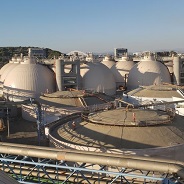Notice of completion: Kingston Biosolids & Biogas Master Plan

Early in 2020, the public was invited to review options and provide feedback on the proposed Kingston Biosolids & Biogas Master Plan. The consultation has been completed and the resulting Master Plan, together with the technical assessment reports and record of consultation, has been posted to the Utilities Kingston website. The public is invited to review the documents and provide comment by September 24, 2020.
After assessing the project alternatives, the preferred alternative was identified as follows:
Develop an integrated biosolids and Source Separated Organics processing facility at a greenfield development site. The opportunity site for consideration would be located within the municipal land adjacent to the snow dump on Perth Road, also called Knox Farm.
Provide public comment by September 24
Public input was considered and reflected in the Master Plan report, which was developed in accordance with Ontario’s Environmental Assessment Act and Regulations.
View the project documents and provide comments by September 24, 2020, to the following individuals:
Utilities Kingston
Allen Lucas
Manager, Research and Projects
P.O. Box 790
Kingston, ON, K7L 4X7
Office: 613-546-1181, extension 2250
Email: alucas@utilitieskingston.com
Tetra Tech Canada Inc.
Peter Klaassen
Vice President – Ontario Division - Solid Waste Management Practice
Office: 226-203-5209
Email: Peter.Klaassen@tetratech.com
Next steps
An environmental assessment will take place at a date to be determined. It will include further public consultation and opportunities to raise comments and questions. Updates will be posted to the Utilities Kingston website as they become available.
Background
The project is helping find ways to:
-
enhance wastewater treatment plants to reduce greenhouse gas emissions; and
-
capture and make local use of the biosolids and biogas that are beneficial products of wastewater treatment processes.
We continue to lead the way in environmental protection. Our wastewater treatment plants are some of North America’s most environmentally progressive and responsible. This initiative will help us pursue innovative solutions to further reduce carbon emissions and protect the environment, while reducing organics sent to landfill in Kingston.
Reducing GHGs and creating renewable natural gas for local use
The wastewater treatment process offers a great opportunity to reduce greenhouse gas emissions (GHG) because it produces methane gas (biogas) from digesting organic solids. Methane is 35 times more potent than carbon dioxide as a greenhouse gas if simply released to the atmosphere.
This Master Plan recognizes the methane produced through wastewater treatment is a renewable resource and proposes to enhance its production so that it can be captured and used as a substitute for petroleum natural gas. The creation and use of this renewable natural gas could reduce community GHG emissions significantly.
The Master Plan discusses the following considerations:
-
Capital costs and potential timelines.
-
Preferred location for biogas production: the municipal land adjacent to the snow dump on Perth Road, also called Knox Farm.
-
End-uses for the biogas: Options to be considered include use of the renewable natural gas for electrical generation, heating, purifying for pipeline injection or vehicle fuel.
-
Adding organics to produce more biogas: The project also considers whether to include organic material as “feed” to enhance the production of biogas and whether to obtain material from an existing company or construct facilities to receive and prepare organics for processing.
-
Exploring options for managing biosolids: Currently, we dispose of biosolids by applying dewatered solids to land. This provides a benefit to the agricultural community as the material is an organic fertilizer with beneficial micronutrients. The project will review the long-term viability of this program, while considering options for further processing the material to create a beneficial soil amendment or other end uses such as feedstock for cement kilns.
More information
-
Technical assessment reports: preliminary and detailed.
-
View the project webpage.
-
Learn about wastewater treatment.